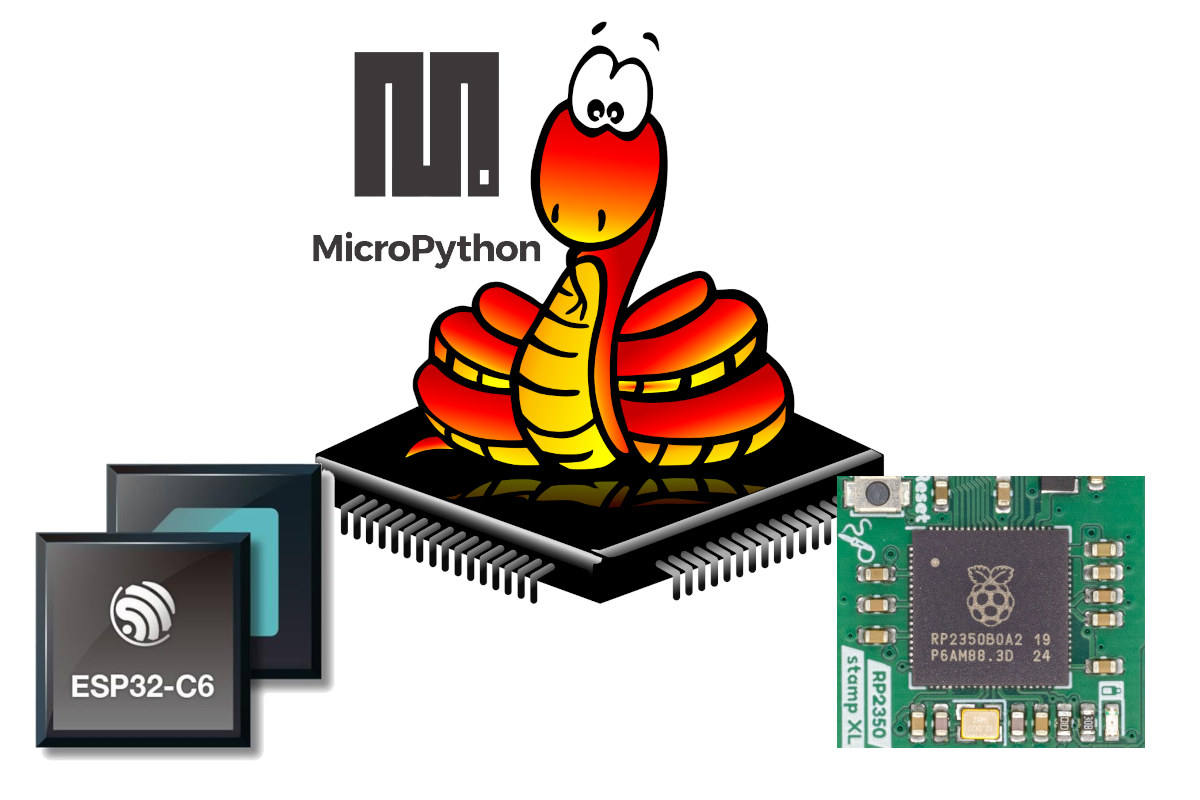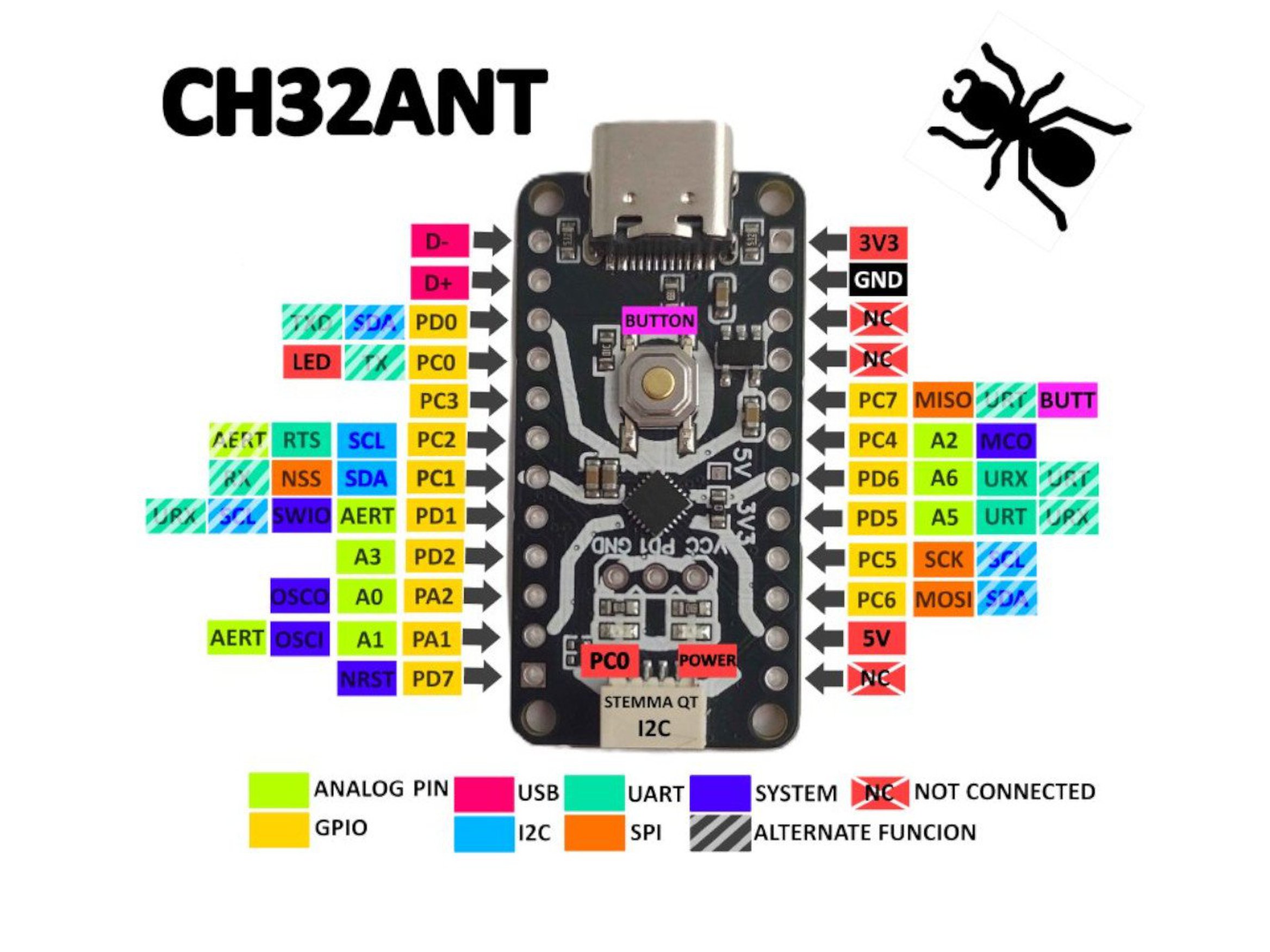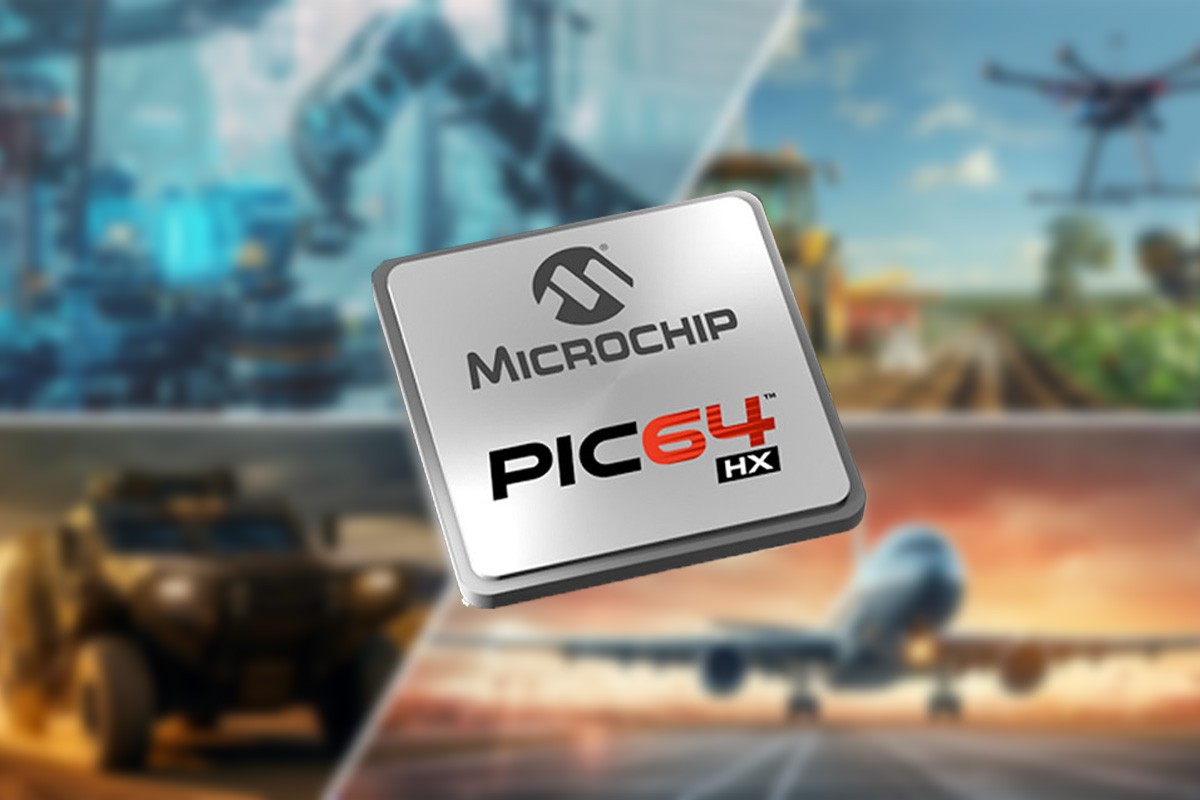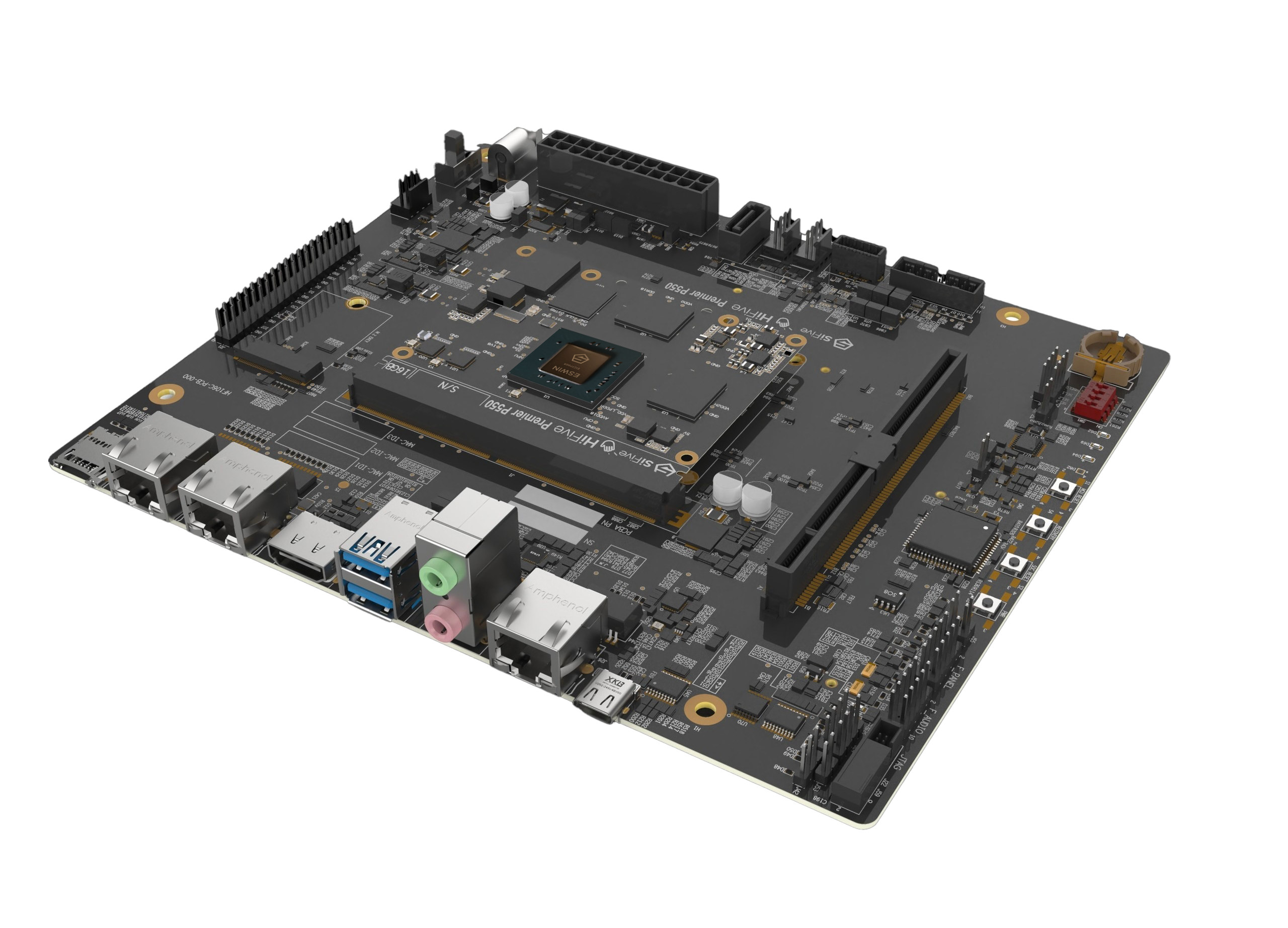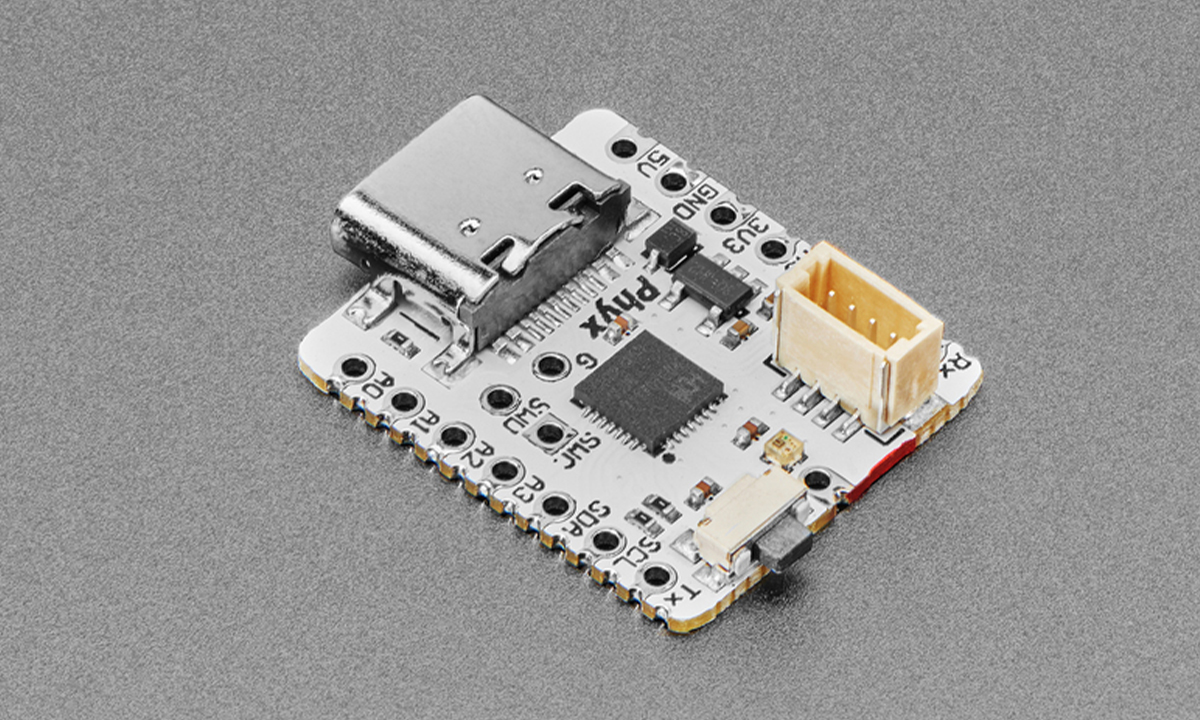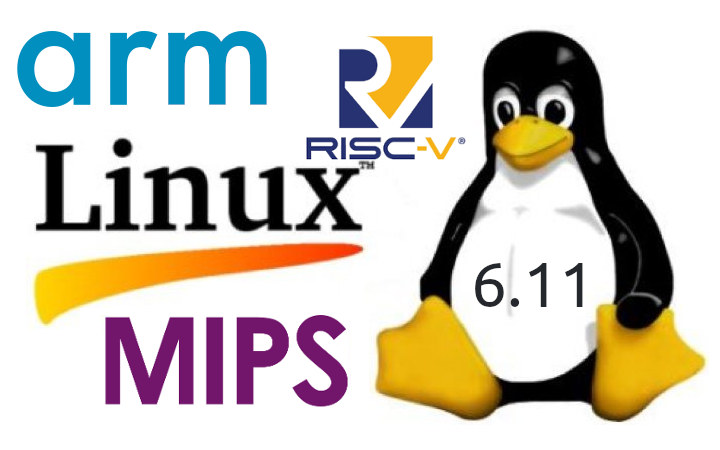MicroPython has become one of the most popular ways of programming microcontrollers, and the just-released MicroPython v1.24 adds support for the widely-used Raspberry Pi RP2350 and Espresif ESP32-C6 microcontrollers and a range of other changes. Those include improved RISC-V support with native code generation, an updated Zephyr v3.7.0 RTOS with threading support, unified TinyUSB bindings across ports, a portable UART IRQ API, and enhanced mpremote recursive copy. Damien George goes into more detail about the RISC-V improvements: … include an RV32IMC native code emitter, native NLR and GC register scanning implementations for 32- and 64-bit RISC-V, support for placing RV32IMC native code in .mpy files and also freezing it, and RISC-V semihosting support. Testing for RISC-V is done with the qemu and unix ports, and the support is utilised in the esp32 and rp2 ports. The Raspberry Pi RP2350 comes with both Arm Cortex-M33 and RISC-V cores, and the good […]
$5 CH32-Ant CH32V003 RISC-V development board comes with Stemma QT connector
The CH32-Ant is a low-cost, breadboard-compatible development board powered by the WCH Electronics CH32V003-F4U6 RISC-V microcontroller, ideal for prototyping. It is pin-compatible with Prokyber’s ESP32-C6-Bug, offering an easy transition for users who don’t need wireless capabilities or the higher performance of the ESP32-C6FH4. The board features a Stemma QT connector for straightforward I2C sensor integration and a USB Type-C port that supports data transfer and power through software-based USB on the CH32V003. The CH32-Ant offers configurable logic voltage at 3.3V or 5V, adjusted via an onboard 0-ohm resistor, providing flexibility for sensor projects. Powered by the CH32V003F4U6 microcontroller, it operates up to 48MHz with 2kB of RAM and 16kB of flash, making it cost-effective for applications requiring basic processing without wireless. The CH32-Ant features a compact layout designed for breadboard compatibility, a Stemma QT connector for an I2C module on one end of the board, and a USB Type-C connector […]
Microchip PIC64HX1000 64-bit RISC-V AI MPU delivers post-quantum security for aerospace, defense, and automotive applications
Microchip recently unveiled the PIC64HX1000 64-bit RISC-V AI microprocessor (MPU) family designed for mission-critical intelligent edge applications in the aerospace, defense, industrial, and medical sectors thanks to a quantum-resistant design. These new MPUs feature eight SiFive’s Intelligence X280 cores, each clocked at 1 GHz. The MPUs are engineered with a decoupled vector pipeline enabling 512-bit operations enabling the PIC64HX1000 to achieve up to 2 TOPS for AI/ML processing and come equipped with integrated Time-Sensitive Networking (TSN) Ethernet connectivity. This new microprocessor includes a dedicated system controller for runtime monitoring and fault management, WorldGuard architecture for workload isolation, and post-quantum defense-grade cryptography, which includes the NIST-standardized FIPS 203 and FIPS 204 cryptographic algorithms, ensuring protection against future quantum computing threats. PIC64HX1000 64-bit AI MPU specification MPU variants PIC64HX1000 – IN (Industrial) PIC64HX1000 – AV (Aviation) PIC64HX1000 – MI (Military) CPU – 8x 64-bit RISC-V cores (SiFive X280), up to 1 GHz, […]
HiFive Premier P550 mini-DTX motherboard features ESWIN EIC7700X RISC-V AI SoC, up to 32GB DDR5, a PCIe x16 slot
SiFive HiFive Premier P550 is a mini-DTX (203 x 170mm) motherboard powered by a 1.4 GHz ESWIN EIC7700X quad-core RISC-V SiFive P550 SoC with up to 19.95 TOPS of AI performance, and equipped with up to 32GB LPDDR5 memory and a 128GB eMMC flash all soldered on a system-on-module. The motherboard itself features a SATA III connector for data storage, includes an HDMI 2.0 port for 4K video output, a PCIe Gen3 x16 slot (working at x4), two gigabit Ethernet ports, an M.2 Key-E socket to add a WiFi/Bluetooth card, up to five USB interfaces, and more. HiFive Premier P550 specifications: SoC – ESWIN EIC7700X CPU 4x SiFive Performance P550 RV64GC RISC-V cores @ 1.4GHz (up to 1.8GHz when overclocked) with Cortex-A75-class performance 32KB(I) + 32KB(D) L1 Cache 256KB L2 Cache 4MB shared L3 Cache Cache supports ECC (support SECDED) NPU (Not currently supported in software) – Up to 19.95 […]
Phyx LANA-TNY – A WCH CH32V203 RISC-V development board for embedded applications
The LANA-TNY is a compact development board created by Phyx and built around the CH32V203 RISC-V microcontroller. It offers a low-cost solution for embedded development and features a built-in USB bootloader, eliminating the need for an external programmer to flash the firmware. With a USB-C connector and a minimalist design, the board provides essential components to start development quickly. At its core, the Phyx LANA-TNY is powered by the CH32V203G6U6, a 32-bit RISC-V microcontroller from WCH Electronics, capable of running up to 144MHz with 1-cycle multiply/divide operations. It includes 10KB of SRAM, 32KB of single-cycle Flash, and 224KB of additional external flash for program or data storage, though the external memory operates at a slower speed. The CH32V203 microcontroller supports a range of peripherals, including ADC, timers, USB devices, UART, I2C, and SPI, making it suitable for a wide variety of embedded applications. Designed in the style of Adafruit’s QT […]
Olimex RVPC is a one Euro RISC-V computer kit with VGA and PS/2 connectors
Olimex RVPC is one Euro RISC-V computer powered by a WCH CH32V003 RISC-V microcontroller and equipped with a VGA port for video output and a PS/2 connector to connect a keyboard. You won’t be able to do much with this device as an end-user, but it does not matter since the RVPC open-source hardware board mostly targets the education market and is offered as a kit to be soldered to lower the selling price and to serve as a soldering learning kit. Olimex RVPC specifications: MCU – WCH CH32V003 32-bit RISC-V2A microcontroller up to 48 MHz with 2KB SRAM, 16KB flash (SOP8 package with 6x GPIOs) Video Output – VGA connector (3x GPIO used for Vsync, HSync, and RGB) Keyboard port – PS/2 connector (2x GPIO used) Programmer port – 2-pin header for CH32V003 programming through a board such as ESP32-S2-DevKit-LiPo-USB Misc – Buzzer (1x GPIO) and Red power LED […]
ESP32-C6 WiFi 6 and Bluetooth 5.0 USB-C development board integrates 1.47-inch TFT LCD Display
Waveshare has introduced the ESP32-C6-LCD-1.47 development board powered by an ESP32-C6 RISC-V microcontroller with WiFi 6 and Bluetooth 5 connectivity and equipped with a 1.47-inch display with a 172×320 resolution. With a 4MB flash, an RGB LED, and a microSD card slot for extra storage, this board is suitable for projects that need a compact display, low power consumption, and wireless connectivity such as AIoT applications and human-machine interfaces (HMI). Earlier this month, we covered the ESP32-S3 USB dongle, another development board from Waveshare designed for HMI applications with the same 1.47-inch display with a 172×320 resolution, but a USB Type-A port instead of the USB-C port found in the model covered today. In the past, we’ve written about other ESP32-based development boards for HMI applications, including the LILYGO T-HMI, ESP32-S3-Touch-LCD-4.3B, and Waveshare’s ESP32-S3 LCD Driver Board supporting both square and round displays. Feel free to check them out if […]
Linux 6.11 Release – Notable changes, Arm, RISC-V and MIPS architectures
Linux 6.11 is out with Linus Torvalds’ announcement on the Linux kernel mailing list (LKML): I’m once again on the road and not in my normal timezone, but it’s Sunday afternoon here in Vienna, and 6.11 is out. The last week was actually pretty quiet and calm, which is nice to see. The shortlog is below for anybody who wants to look at the details, but it really isn’t very many patches, and the patches are all pretty small. Nothing in particular stands out – the biggest patch in here is for Hyper-V Confidential Computing documentation. Anyway, with this, the merge window will obviously open tomorrow, and I already have 40+ pull requests pending. That said, exactly _because_ I’m on the road, it will probably be a fairly slow start to the merge window, since not only am I on my laptop, there’s OSS Europe starting tomorrow and then the […]


